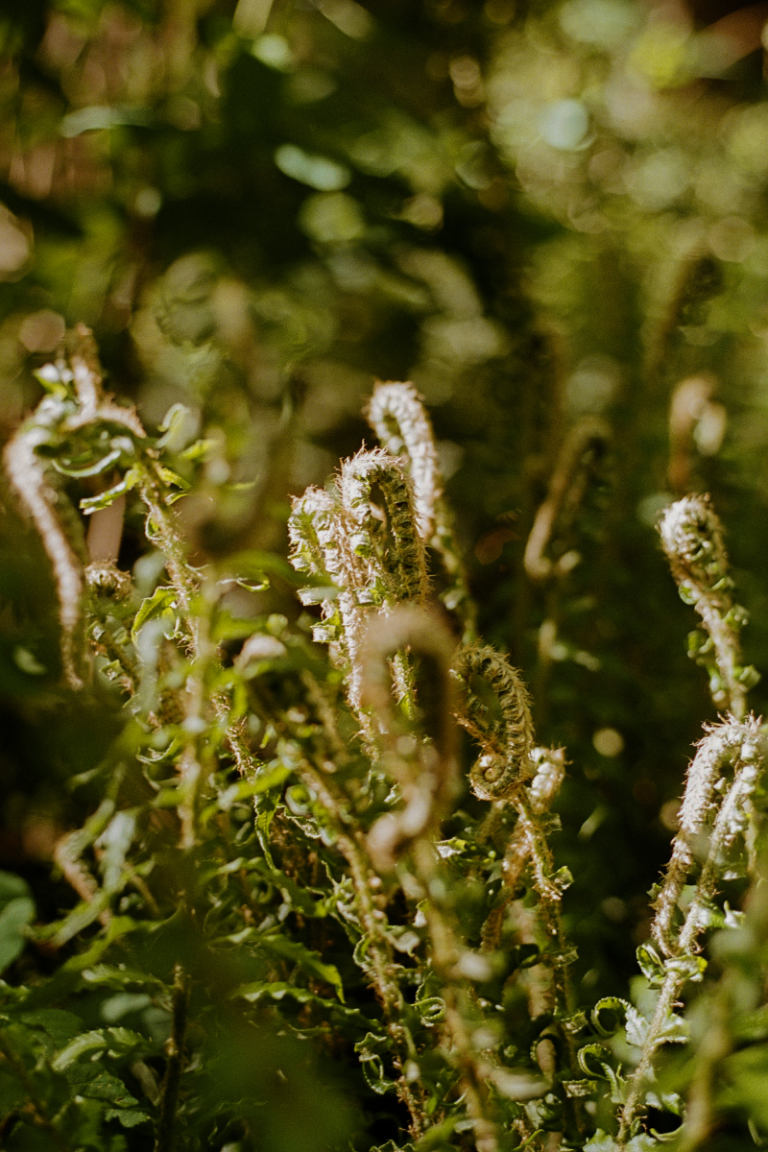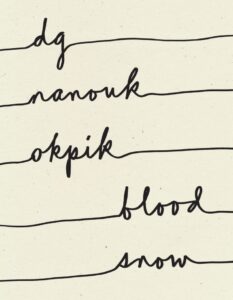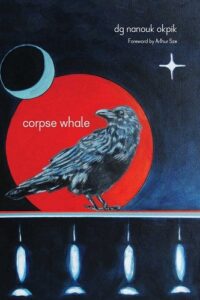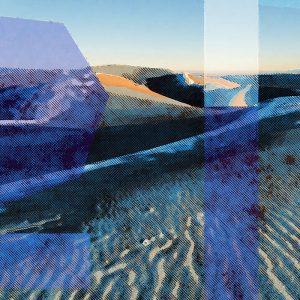dg nanouk okpik
In a Lock of Hair
If you could put a lock of your hair under a microscope, what would it contain? DNA certainly, but here in dg nanouk okpik’s poem, the hair also contains memory, smell, location, disease, dreams, and medicine.
We’re pleased to offer dg nanouk okpik’s poem, and invite you to connect with Poetry Unbound throughout this season.

Image by Annisa Hale/ Film processed by Moody's Film Lab, © All Rights Reserved.
Guest

dg nanouk okpik is Iñupiat-Inuit from Alaska. Her first book, Corpse Whale (University of Arizona Press, 2012), won the American Book Award and May Sarton Award. okpik was long-listed for the PEN American Award for Blood Snow (Wave Books, 2022). She is a Lannan Fellow with the Institute of American Indian Arts. okpik resides in Santa Fe, NM.
Transcript
Transcription by Alletta Cooper
[music: “Praise the Rain” by Gautam Srikishan]
Pádraig Ó Tuama: My name is Pádraig Ó Tuama, and I like all kinds of poems and all kinds of art. Sometimes you read a poem and you go, “Oh, I have the way in.” Or you go to a gallery and you see a piece of art and you think, “Okay, I get it. I may like or not like the message, but I get it. I see what’s happening.”
But sometimes you look at something and you go, “I don’t know what I’m seeing.” Or you read something and go, “Why does that word follow that word and that word?” And sometimes you can feel a bit foolish to think, “Maybe I didn’t pay attention in school that day, or I’m not clever enough to get it.”
But the piece of art has an intelligence that’s emotional, and often I think the experience you feel while you look at something is actually part of the response to the art. So when I read a poem where I go, “I don’t get it,” I allow that to be part of the experience. And I think, “What an intelligent poem to communicate confusion to me in a poem that might be saying, ‘What on earth is happening to me?’”
[music: “Praise the Rain” by Gautam Srikishan]
“In a Lock of Hair” by dg nanouk okpik
“In a lock of hair becoming a spine-like tendon,
in stagnant blood might I find—I don’t know.
Liquid, light, glass grooved and lashed together:
“a brown feathered and horned-angel owl,
damned in a part of breast-cusped armpit.
“Where spindle, shanks, polished by gray silt, dash
ruined my middle chest, caves in. When a wasp
nest unravels the gray paper like a head of lettuce.
“A corroded filament of a white bear’s heart
shines in warm snow like frozen fireflies stuck
in the air still yellow. A bulldozer digs the taiga.
“A Nuwuk whale captain hones the shoreline,
wishes the whale-people to come: scouts first,
middle males, females and young then older whales.
“Shades and drifts of tangled oceans, labyrinths in
navigational mapping turn upon itself like dragon’s tail.
Right ventricle then left ventricle boils like copper in vats.
“Radiation of a lumbar sack and coccyx, wires drip dip
coils, inverted cones, dug for sifts & wood black peat soil &
as five red robins’ beaks funnel earthworms in haste.”
[music: “Catching Water” by Gautam Srikishan]
I’ve been reading dg nanouk okpik’s work for years, and with this particular poem, I feel like the best way to know what might be happening in the poem is to think of it like some kind of microscope. The title is “In a Lock of Hair,” so I think of this poem as looking at a lock of hair down through the lens of what you can see in it and then what you can see through it. The poetic as well as the scientific, the locational. And in a lock of hair, what you find is the self of the person, and the place that they’re from — smells and histories and memories. And what’s been displaced and erased as well. There’s fear there, as well as the locations, the landscapes, about what has been around, what other beings are living and thriving. There’s death in this lock of hair, and cancer, and medication, and survival, too, and profound sense of vision and place.
In a certain sense, too, it has the DNA of a dream. It’s almost like you’re being dropped into somebody’s dream and they’re thinking about their own health. dg nanouk okpik has been living with cancer for a while, and so you’re thinking about health and thinking about all the things that come in the correlation between cancer and hair and health. And in all of this, what you see — it’s such a characteristic of this poem and all of dg nanouk okpik’s work — there’s no borders: the living and the dying; those that live in water, those that live on land; the breathing, living earth; and the breathing, living human. This poem eradicates borders, and just says: What’s there? Everything is in the one thing. Let’s look at it and see it all.
[music: “Into the Earth” by Gautam Srikishan]
dg nanouk okpik is an Iñupiaq Inuit from Alaska. I believe she lives in New Mexico now. And she was raised in Anchorage, and she’s fished the waters of the region where she was raised. And in the world of her poetry, you see land and architecture and wildlife and personhood all correlating to each other and often also you see Iñupiaq associations occurring in the poem, too. And so references to the Nuwuk whale captain honing the shoreline in this poem, and then “the whale-people to come: scouts first, / middle males, female and young then older whales.” And then a couple of stanzas later we’re talking about “radiation of a lumbar sack and coccyx, wires drip dip / coils.”
She says, and she quotes somebody, I can’t remember who it is, but she says that a poem should do 40% of the work and the reader has to do 60%. And I really do feel like this poem asks a lot of the reader to say, “What’s happening?” In a way, it’s in conversation with certain modernist literature. I think of James Joyce’s Ulysses, I think of literatures from all over the world where somebody says, “This is what it’s like inside all of our heads.” One minute you’re thinking about your medication. The next minute you’re thinking about the place you’re from. The next minute you’re thinking about a story you heard when you were younger. The next minute you’re thinking about an animal. The next minute you’re back to your medication. And all of that happens second to second, microsecond to microsecond. This poem is dropping us in there and holding it all together in a certain sense, giving us a map of a mind and saying: this is what it’s like to be a person, and in one person all these things are happening.
[music: “Toothless Slope” by Blue Dot Sessions]
This poem has multiple references to cancer. There’s the “breast-cusped armpit,” and then “middle chest” and “radiation of a lumbar sack” and “drip dip.” Cancer is a repeating theme in this whole book Blood Snow. And here, in a close examination of a lock of hair, I think one of the things you’re seeing is a person giving close examination to their own body and their own body as medications are being put into it and thinking about the experience of that, but then trying to link that with other living things and other dying things.
And she’s even then bringing in the bulldozer, saying that too, or whoever’s working it, perhaps the bulldozer as it’s ripping up the earth is being in some kind of correlation to whatever is happening in her, either through illness or through the curing of illness. She’s in a certain sense, perhaps, including her body as something that’s being dug into, as you might think about any medical intervention, but also saying, “The land is a body, the land is breathing, too.”
[music: “Every Place We’ve Been” by Gautam Srikishan]
There’s four similes in this poem. A simile is where you say this thing is like that thing. And the four similes are: “a wasp / nest unravels the gray paper like a head of lettuce.” And then the next one coming right after that is a “bear’s heart / shines in warm snow like frozen fireflies.” And then, a couple of stanzas later, there’s two more in quick succession: “labyrinths in / navigational mapping turn upon itself like dragon’s tail.” And then, “right ventricle then left ventricle boils like copper in vats.”
They’re demanding on the tongue to say. And you think of “gray paper like head of lettuce.” There’s such contradiction. I think of lettuce as white and green, and I don’t think of it like paper. I think of it as something more like skin. And then “shines in warm snow like frozen fireflies.” “Warm snow,” “frozen fireflies.” dg nanouk okpik is putting so many unexpected things next to each other, and by saying one thing is like another thing, she’s also making us realize nothing’s like anything, that there’s strangeness and similarity that comes along. You could say that one of the things this poem is doing is asking the question of, “Who am I through the lens of my lock of hair? And what is the coded information in a lock of my hair?”
But what dg nanouk okpik does in the poem is to say the question of who am I is also linked to the question of who are we and where have we come from? And “we” isn’t just immediate family, it’s also other beings that live on the land. And it’s also the land and it’s also the water, and it’s also who lives in the water and what’s been done on the water, and what’s being done on the land.
[music: “Catching Water” by Gautam Srikishan]
“In a Lock of Hair” by dg nanouk okpik
“In a lock of hair becoming a spine-like tendon,
in stagnant blood might I find—I don’t know.
Liquid, light, glass grooved and lashed together:
“a brown feathered and horned-angel owl,
damned in a part of breast-cusped armpit.
“Where spindle, shanks, polished by gray silt, dash
ruined my middle chest, caves in. When a wasp
nest unravels the gray paper like a head of lettuce.
“A corroded filament of a white bear’s heart
shines in warm snow like frozen fireflies stuck
in the air still yellow. A bulldozer digs the taiga.
“A Nuwuk whale captain hones the shoreline,
wishes the whale-people to come: scouts first,
middle males, females and young then older whales.
“Shades and drifts of tangled oceans, labyrinths in
navigational mapping turn upon itself like dragon’s tail.
Right ventricle then left ventricle boils like copper in vats.
“Radiation of a lumbar sack and coccyx, wires drip dip
coils, inverted cones, dug for sifts & wood black peat soil &
as five red robins’ beaks funnel earthworms in haste.”
[music: “Praise the Rain” by Gautam Srikishan]
Chris Heagle: “In a Lock of Hair” comes from dg nanouk okpik’s book, Blood Snow. Thanks to Wave Books and dg who gave us permission to use her poem. Read it on our website at onbeing.org.
[music: “Praise the Rain” by Gautam Srikishan]
Poetry Unbound is: Gautam Srikishan, Eddie Gonzalez, Lilian Vo, Lucas Johnson, Amy Chatelaine, Kayla Edwards, and me, Chris Heagle.
Our music is composed and provided by Gautam Srikishan and Blue Dot Sessions.
This podcast is produced by On Being Studios, which is located on Dakota land. Open your world to poetry with us by subscribing to our Substack newsletter. You may also enjoy Pádraig’s new book, Poetry Unbound: 50 Poems to Open Your World. For links and to find out more visit poetryunbound.org.
Books & Music
Recommended Reading
The On Being Project is an affiliate partner of Bookshop.org and Amazon.com. Any earnings we receive through these affiliate partnerships go into directly supporting The On Being Project.









